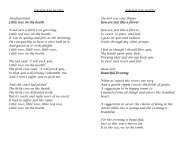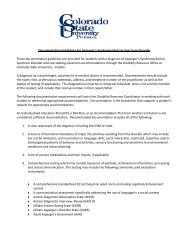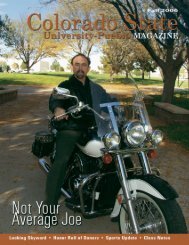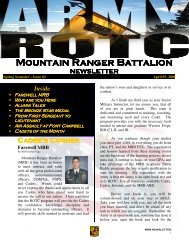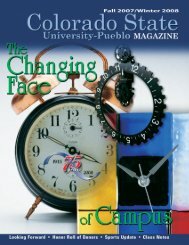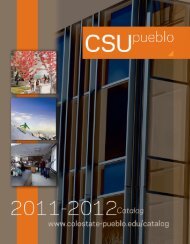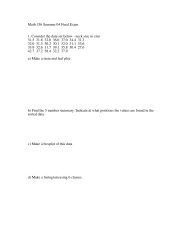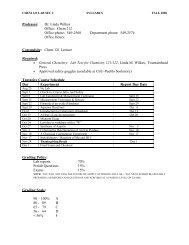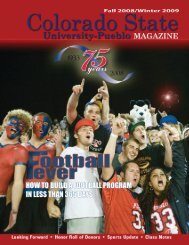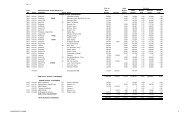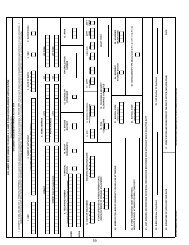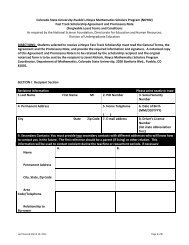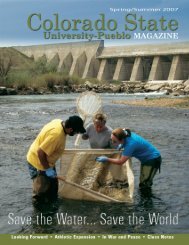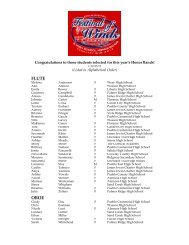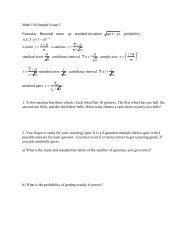2007-2008 Catalog (PDF) - Colorado State University-Pueblo
2007-2008 Catalog (PDF) - Colorado State University-Pueblo
2007-2008 Catalog (PDF) - Colorado State University-Pueblo
You also want an ePaper? Increase the reach of your titles
YUMPU automatically turns print PDFs into web optimized ePapers that Google loves.
College of Humanities and Social Sciences<br />
• KTSC-FM (on-campus radio station)<br />
• KTSC-TV (on campus PBS affiliated station)<br />
• CNM Productions (remote production truck)<br />
Media labs are at the discretion of the faculty<br />
advisor. Students may earn a maximum of 9<br />
credits in media labs.<br />
2) In addition, Mass Communications/Center for New<br />
Media majors and minors are encouraged to join<br />
and participate in additional co-curricular activities<br />
on campus and through community and <strong>University</strong><br />
projects.<br />
Students desiring internships must have a 3.0<br />
grade point average in their Mass Communications<br />
courses. Internships are not required, are<br />
most often reserved for majors, and are at the<br />
discretion of the faculty advisor. Students may<br />
earn a maximum of 8 hours of internship credit.<br />
Specific Requirements for the Mass<br />
Communications/Center for New Media Minor<br />
Students desiring a minor in Mass Communications<br />
must complete 21-credit hours approved by their minor<br />
area advisor and MUST include MCCNM 101 and 201.<br />
The minor may not include more than 3 credits of media<br />
lab and must include at least 6 hours of upper division<br />
Mass Communications coursework. Students must earn<br />
a C or better in all Mass Communications courses, in<br />
order to be eligible for graduation with the required 2.0<br />
in the minor. Students who earn grades of D+ or below<br />
will be required to repeat the course in order to be<br />
considered for a minor in Mass Communications.<br />
Outcomes Assessment Activities<br />
Student success is measured through a variety of<br />
methods that include classroom writing samples,<br />
portfolios of student work, professional internship<br />
evaluations, exit interviews, student employment upon<br />
graduation, and alumni feedback.<br />
Each major or minor is encouraged to maintain an<br />
academic portfolio of all salient work or projects<br />
completed while in the department. Department faculty<br />
will review and evaluate a selection of portfolios in the<br />
spring of each year to track student progress. Each<br />
emphasis area adviser also maintains a file.<br />
The Mass Communications Department/Center for<br />
New Media insists that the academic portfolio demonstrate<br />
a pattern of sustained academic growth and<br />
development of the major and minor, appropriate to<br />
the student's emphasis area.<br />
The academic portfolio should reflect the quality and<br />
level of intellectual and scholarly work undertaken by<br />
the student while in the department, relative to the<br />
qualitative, quantitative, ethical, legal and aesthetic<br />
dimensions of the field. The appropriateness of the<br />
content is dictated by the student's emphasis area and<br />
is prescribed by the individual's advisor.<br />
A student may be required to participate in an exit<br />
interview during his or her final semester. Students are<br />
selected on a random basis from enrollments in the<br />
department's capstone course, Mass Media Seminar.<br />
MILITARY SCIENCE (US ARMY)<br />
(Reserve Officers’ Training Corps Program)<br />
Professor of Military Science: Lieutenant Colonel<br />
James Desjardin; Assistant Professors of Military<br />
Science: Major Greg Cyr, Senior Military Science<br />
Instructors: Sergeant First Class Gener Molina,<br />
Sergeant First Class Antonio Cruz<br />
The Army ROTC Program<br />
The focus of this program is to recruit, develop, and<br />
commission college-educated men and women to<br />
serve in the United <strong>State</strong>s Army. Participants in the<br />
program are commissioned as a Second Lieutenant in<br />
the Army upon graduation with a bachelor’s degree.<br />
They will be expected to serve in either the active<br />
Army or in the Reserve Components (Army Reserves<br />
or Army National Guard) after commissioning.<br />
The program is centered on teaching the principles of<br />
leadership. These principles can be applied to<br />
positions in the military or in civilian careers. All<br />
courses of instruction are designed to develop<br />
leadership and management skills as well as enhance<br />
the self-confidence and initiative of each student.<br />
Military Science is taken in addition to the required<br />
courses for each student’s major.<br />
ROTC is a four-year program that is divided into two<br />
phases: the Basic Course and the Advanced Course.<br />
A minor in Military Science is available for qualified<br />
students.<br />
The Basic Course<br />
The focus for these lower division courses (MSL<br />
100/200 courses) is to lay a foundation for more<br />
advanced instruction in the skills needed to be a<br />
successful leader. Students may participate even if<br />
141



